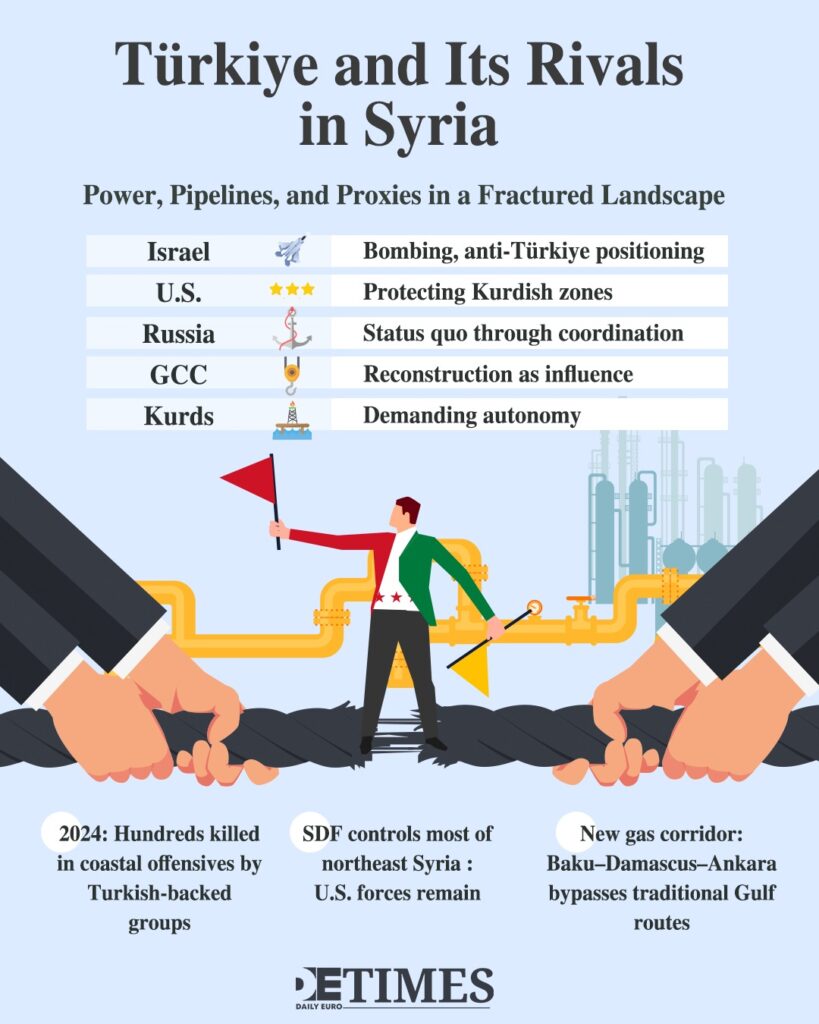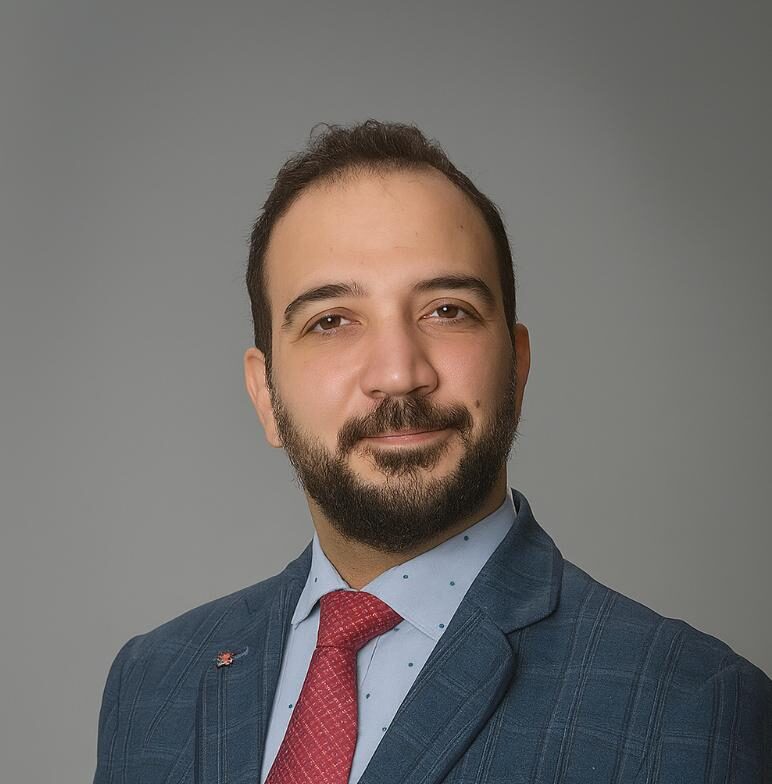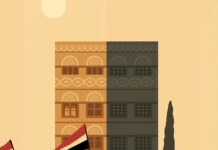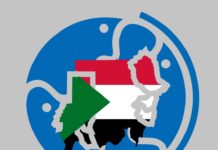The dangerously bloody events that Syria has witnessed since the fall of the Assad regime are gravitating towards a regional order aligned with it’s northern neighbour: Türkiye. Events align with perceptions of the political condition in Damascus, which operates on a centralised system.
Any federal or autonomous system for Syrian minorities, whether the Druze in the south or the Alawites on the coast, would help the Kurds establish a region in Syria and this is something Türkiye cannot tolerate.
Türkiye: No Federalism in Syria, No Balanced Partners
The events in the coastal areas and Suwayda are part of Damascus’ centralisation desired by Ankara.
Such events, alongside the postponed reckoning with the Syrian Democratic Forces, are part-and-parcel of a broader Sunni Syrian centralisation plan. In fact, it is an indicator of the broader nature of the regional conflict Türkiye is waging against numerous regional powers in the country.
It does not mean that Ankara strives for a Syrian strongman, but rather a centralised political system with a decentralised security apparatus represented by local militias, tribes, and cross-border groups.
Erdogan’s rejection of a federal system in Syria is underpinned by primordial logic: any established region in Syria will ally with other external players and therefore accumulate considerable influence.
Turkish Proxies Instead of Iranian Proxies
Ankara has good reason to believe in such logic.
With the collapse of Iranian influence and the decline of Russia’s role, Ankara is now recognisable as the primary player in Syria.
The current authority is composed of forces that controlled Damascus with direct Turkish support. Four days after the fall of the Syrian Ba’athist regime, the head of Turkish intelligence, Ibrahim Kalin, travelled to Damascus in a clear message that Erdogan wanted to declare himself as an alternative in Damascus to the Kremlin and of course, the Iranian Revolutionary Guards Corps.
Regardless of whether Türkiye knew that Assad was on his way out or was surprised like others, Hayat Tahrir al-Sham (formerly Jabhat al-Nusra), led by Syrian President Ahmad al-Sharaa, would not have survived in Idlib throughout years of the civil war without the lifeline thrown to it by Ankara.
According to Reuters, groups involved in the government-led operations on the coast that killed hundreds of Alawites and security personnel last March, such as the Sultan Suleiman Shah Brigade and the Hamza Division, are directly supported by Ankara. Other groups receiving lesser support also participated, such as Jayish al-Islam, Jayish al-Ahrar, and Jayish al-Izza.
There are also transnational militias that are part of the Turkish axis of influence in more than one region, such as the Turkistan Islamic Party (TIP), Uzbeks, Chechens, and some Arab fighters.
However, there are other players that could compete with the Turks: the U.S., the Gulf Cooperation Council, and Russia. Each of these powers has distinct mechanisms for addressing the Syrian issue, as well as varying geographical scope.
Therefore, if current dilemmas remain unsolved, there are many avenues for open conflict rooting from regional and international rivalry.
Suwayda: Syrian-Turkish Adventure and the Israeli Resettlement
The first apparent problem remains open-ended: Türkiye and Israel.
Both states maintain diplomatic and economic relations despite tensions over the war in Gaza. However, Israel appears uneasy about Turkish influence, which has become an alternative to Iranian influence on its northeastern border. Türkiye’s role is expanding, and its political and military presence may constitute a direct threat to Israel.
Despite the numerous talks held between Israel and Syria to resolve their differences, or at least to return to the 1974 ceasefire agreements, the actions in Suwayda to take control of the city and its villages, could be identified as a Syrian-Turkish test of how to extend their influence into this region.
This time, the Syrian political authority and the Turkish-backed militias sought to avoid direct involvement in events, as happened on the coast, leaving matters to tribal militias to confront the local militias entrenched in Suwayda and some of its villages.
Yet the results were disastrous and Damascus failed to keep its hands clean of blood on the ground and in the media.
Against the backdrop of this crisis, Hikmat al-Hijri, one of the key Druze sheikhs who became an opponent of al-Sharaa’s rule, called on Israel to intervene for protection. Israel struck Damascus, targeting a military headquarters in the capital.
In practice, Israeli support for the Druze was not because they are “our Druze brothers” as Netanyahu said, but rather an issue that Israel can leverage to counter Turkish influence. This is part of a broader picture of Israel rejecting Turkish military influence in Syria, especially in the central, desert, and southern regions.
For example, Israeli officials, during a meeting with their Turkish counterparts in Azerbaijan, warned against establishing bases in Syria. The Turks exchanged warnings with the Israelis against exploiting the unstable situation in Syria.
The Gas Agreement: Azeri and Turkish Centralisation
The gas agreement between Azerbaijan, Türkiye, and Syria could be interpreted as an opportunity for Israel to obtain another source of gas, especially since Syrian officials met with their Israeli counterparts in Baku.
Whilst this presents an opportunity for Israel, it is as well a card for the Syrian regime in any negotiations should there be a serious intention to engage in the Abraham Accords. Damascus does not hold many cards in any hypothetical peace negotiations. However, this situation strengthens Türkiye’s position in Syria, thus representing a pressure factor on Israel, not vis-à-vis Syria, but rather Türkiye.
If a decisive agreement is not reached between Syria and Israel, this could strengthen a new hostile front on its northeastern border.
In other words, the importance of supplying Israel with gas through Syria, and of Damascus playing a never-before role as a corridor for energy, depends on the success of the peace negotiations. Yet, the danger will be greater if they fail, especially since it would add a new element to the conflict: energy.
Another effect is that this agreement also challenges an idea floated since 2009 that would connect Qatari gas to Syria and then Türkiye via a pipeline passing through Saudi Arabia and Jordan or Iraq. Despite the difficulty of implementing this idea, Türkiye’s initiative to connect Damascus to Baku is a clear attempt by Ankara to assert its economic, political, and security dominance within Syria.

Russian Military Bases: The Old Order, the New Order
Türkiye theoretically rejects a Russian presence on the Syrian coast, especially if it leads to the support of Alawite political elites in any decentralisation effort.
However, sources in Israel Hayom suggest that Turkish President Erdogan’s desire for “neo-Ottoman” control over Syria could push Israel into conflict with Ankara in Syria. Sources highlight the futile Russian presence, as there is a possibility that Türkiye might come to an agreement, which would result in the Russian presence aligning with the Turkish-Syrian axis rather than Israeli ones.
Seemingly, the shift in alignment is already happening. Syrian Foreign Minister Asaad al-Shaibani visited Moscow. Following the visit, the Foreign Ministry stated that Damascus "appreciates Russia's clear commitment to supporting Syria in the face of Israeli aggression." This development represents a fundamental turning point that keeps Russia relevant in Syria should it lean towards Ankara and Damascus.
The Kurds: American Protection and Syrian-Turkish Ambush
On the issue of Syrian Kurdistan, this may represent the most sensitive intersection between the United States and Türkiye.
The political situation in Damascus appears extremely hostile to any decentralised approach to relations with the Kurds, who demand federalism and control large areas east of the Euphrates, including Arab clans’ regions formerly controlled by ISIS.
This has a background dating back to the civil war. Türkiye and its allies in the Syrian National Army, one of the most important armed opposition groups to Assad, launched Operation Euphrates Shieldagainst the SDF in 2016-17. Since then, an intractable rift has emerged between the Kurdish opposition and the Arab and Turkmen opposition, with the Turkish government in the background.
For its part, Washington is allied with the SDF. The White House is not likely to abandon this support for several reasons, including geopolitical ones, given that the Kurds provide a conducive environment for the Americans in areas linking Iran via Iraq to Syria.
Areas under Kurdish control are also oil-rich and tied to American TNCs whilst this connection offers a vantage point to counter any resurgence in Daesh if the new Syrian regime collapses.
The continued existence of the SDF as an independent force worries Erdogan, which is why he insists on integrating it into the central Syrian forces. Although the Syrian authorities entered into an agreement in March with the SDF to manage the relationship, escalation on this issue appears inevitable, especially given the threats issued by the tribes, which have been weaponised against the Syrian Druze.
GCC and Türkiye: Competition or Conflict?
On the surface, the Turks, Saudis, Emiratis, and Qataris share common interests in Syria. Each was interested in the fall of Assad, the ally of Iran, for many different motives although Doha held the most favourable sway under Assad.
The convergence of interests is fundamental to the GCC: Syria has transitioned from a regime ruled by the Alawite minority to a Sunni majority regime, religiously close to Türkiye and the majority of Arabic-speaking countries.
Syria is open to investment, presenting an open field for inward capital and a new consumer market for GCC state investment in energy, logistics, and maritime.
There is a resulting possibility of a power struggle between Türkiye and Arab nations. Recent years have shown that Turkish influence in countries such as Libya and Sudan has led to tensions with Egypt and Gulf states specifically the UAE. Such a conflict would not arise in Syria, provided that Türkiye stays out of economic cooperation between Abu Dhabi, Riyadh, Doha and Damascus.
In Syria itself, during the civil war, Saudi Arabia and the UAE chose different paths than Türkiye.
Abu Dhabi and Riyadh also held contrasting views on extremist Islamist groups, with the former rejecting them outright, while the latter was less opposed to Islamism. Following the Syrian revolution and civil war, these countries became embroiled in a conflict characterised by their support for opposing factions.
Saudi Arabia and the UAE firmly rejected any rapprochement with Jabhat al-Nusra and al-Qaeda, whereas Türkiye and Qatar supported it. This divergence caused a rift that was a major factor in the conflict between these countries until their reconciliation in 2022.
Although the Gulf countries, with the exception of Qatar, are at odds with political Islam, Saudi Arabia and the UAE appear to be moving towards embracing Syria, perhaps to avoid repeating their mistake in Iraq after 2003, when it was left with Iran as its only regional ally. Al-Sharaa has received significant support from Saudi Crown Prince Mohammed bin Salman, most notably during his meeting with US President Donald Trump.
This trend suggests a desire to offer Damascus opportunities through non-Turkish channels, so that Ankara does not remain the sole gateway to stability and with it: political capital.
The Weakness of Arab States: Borderlands Around Syria in the Face of Türkiye
Despite the positive rhetoric in foreign policy, Syria’s trajectory is shaped by regional tensions that make achieving stability difficult without external assistance. It remains unclear whether the Gulf Cooperation Council countries alone are capable of providing such support.
This situation is exacerbated by the fact that the Arab-speaking countries surrounding Syria are grappling with political, security, or economic challenges that hinder their ability to make a decisive contribution to the region.
Jordan fears instability due to the complexities of its relationship with Israel and the strength of the Islamist movement within its borders. Lebanon is at its weakest point unable to fully push for Hezbollah’s disarmament. Iraq, despite some progress in recent years, is suffering from Turkish intervention. Ankara also occupies areas in the northern Nineveh Governorate under the pretext of combating the Kurdistan Workers’ Party (PKK).
At any rate, it is a a uphill battle for Damascus to rid itself of dependency on Ankara.
It does not appear that the current regime is galvanised by the past disasters caused by the tyranny of the previous regime and its reliance on regional and international powers against its own people.
Sharaa’s Damascus, it seems, is following in the footsteps of Assad’s Damascus for good or for worse.
Stay Up to Date with the Latest on DET!
Strategic Silence: Why is Iraq Staying Out of Iran’s War
ISIS 2.0: New Islamism in Syria and Iraq
Internal Dissent: Are there Disagreements within the Iranian Regime






